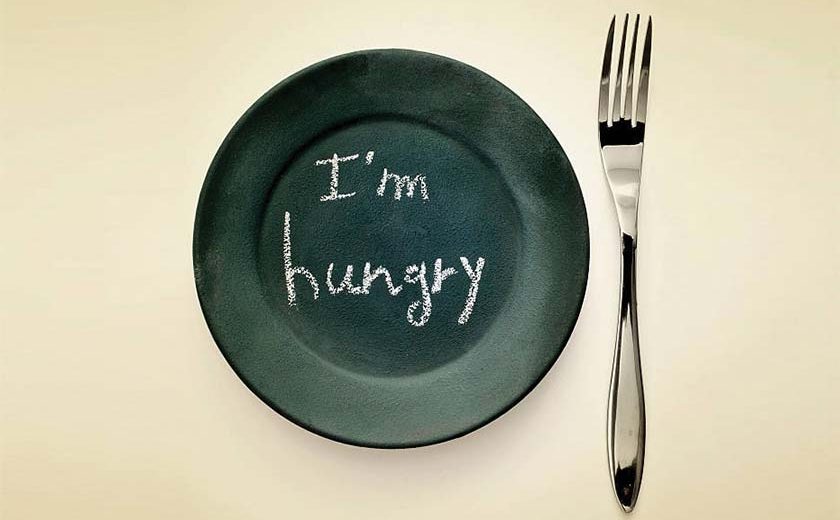Diets fail for a lot of reasons but one of the primary ones is simply hunger. Going on a diet means cutting down on calories, which in turn means consuming smaller amounts of food.

Dr Sharifa Shahreen Sultan
Medical Consultant
Spectrum Of Life (SOL)
This can result in between meal hunger. Believe me, this advice comes from a person with extensive experience in dieting. Let’s face the facts, we all, at some point in time have undertaken the task on going on a diet and experience some kind of hunger issue. In my years of practice, the most common questions I get from my patients are usually:
- Do you have to feel like you’re hungry all the time to lose weight?
- Does this mean you are doing this right?
The answer to that is yes! You are going to have to deal with a little hunger and stomach grumbling while you’re trying to lose weight but constantly being hungry while being on a diet should not occur and I would like to share some reasons as to why you probably feel hungry all the time.
These reasons are easily avoidable, so let us look at how we can keep this hunger monster at bay!
1.You are not consuming enough protein
Protein takes longer for your body to digest, so when you eat enough protein throughout the day, you keep off having hunger pangs. It also helps slow down the digestion of carbohydrates.
Stick to healthy and delicious protein-packed snacks to keep the hunger monster away.
Increasing amounts of research has shown that higher protein intakes help blunt hunger. It also helps that, as long as you’re dealing with sources of lean protein (low-fat fish, skinless chicken, even low-fat red meat), it can be tough to get a lot of calories from protein in the first place.
I’d also noted that there are many other reasons to consume sufficient amounts of lean protein on a weight loss diet including blood glucose stability and sparing of muscle mass loss.
Tip: Ensure your intake of lean protein makes up 30% of your diet.
2. You are skipping meals
The one mistake that we tend to do when starting a diet is to skip our meals. When you skip meals, you put yourself at a higher risk of eating more later. The important thing to note is that you should maintain a consistent meal schedule. You tend to get hungry at the same time no matter what, and keeping constant meal times ensures you can eat when you’re hungry.
Tip: Keep meals at a constant time to reduce hunger pangs!
3. You are gulping down your food too fast!
You may have a tendency to gulp down food in your mouth when you’re really busy without thinking about how you’re messing up your digestion in a big way.This may mean that you are eating healthy but you are bound to feel hungry within minutes of eating.
It takes around 20 minutes for your brain to get the signal from your digestive system that you’re full. Let’s say you rush through a nutritious and well balanced lunch in 10 minutes. Your brain is going to keep thinking you’re hungry and you’re just going to keep on eating even if you’re actually full.
See how easy it is for you to overeat?
Besides giving ample notice to your brain, there are other hormones dependent on your eating patterns that also need time to work.
Researchers from on one study discovered higher levels of satiety hormone peptide YY in participants who ate a 30 minute meal instead of a 5 minute meal. Additionally, studies have proven that when you take longer to chew your food, you not only consume 10% fewer calories, but you also feel fuller when you’re done. Sounds like a winner to me!
Another study presented by a well-known researcher in this field, Dr. Barbara Rolls, showed that an apple is more filling than apple sauce, which is more filling than apple juice.
Why? Because solid food requires chewing, thereby beginning the process of digestion and the release of digestive enzymes that begin to trigger fullness. It simply slows down the process of caloric consumption because it takes longer to chew an apple than to guzzle a 6-ounce glass of apple juice. In addition, an apple contains fibre, which has added benefits.
So make sure the majority of your calories come from solid food, and limit sugary beverages and alcohol, which contain empty calories.
The trick is to chew each bite between 5-30 times before swallowing or placing down your fork in between bites.
4. You are not consuming enough fat
Most people immediately assume that all fat is bad fat, but this myth couldn’t be further from the truth. Fats help slow digestion and increase satiety for hours.Dietary fats also slows down gastric emptying as the meal sits in the stomach longer.
Add more healthy fatty foods to your diet I say!
Choices of good fat are avocadoes, coconut oil, grass fed butter (yes butter is good for you), olive oil, etc.
5. You are eating the wrong carbs
If you’re eating simple, processed carbs such as white bread, cookies, and pizza, it’s hard to stay full while eating the right amount of calories to lose weight. These foods tend to be low in fibre, which makes them less satiating. Also consuming the processed carbs increases spikes in blood sugar followed by a crash, which leads to appetite increase and hunger. Complex carbs, on the other hand, such as quinoa, oats, and whole wheat, offer your body slow-digesting energy and fibre that makes you feel satisfied instead of starving.
Tip: Switch that bagel for homemade overnight oats, choose whole wheat bread over white bread, and use quinoa or brown rice instead of pasta or white rice.
6. Where is the fibre?
Despite the fact that the average adult only eats 15g of fibre every day, men need around 38g of fibre per day and women need about 25g. That’s a lot of missed fibre opportunities if you ask me. Insoluble fibre is what keeps our digestion moving (see ya later constipation!). But soluble fibre actually slows down the process a bit. Don’t worry; this is a good thing!
Soluble fibre turns into a consistency similar to gel and delays digestion so your body has more time to absorb nutrients and feel satisfied. The results from one study show that eating fibre and whole grains together makes you feel fuller longer, which will definitely limit your hunger cravings.
Tip: Get to know things like chia seeds, nuts and other seeds. And include more fibre filled veggies to make your meals last longer.
7. You are not drinking enough water
You may not know you’re dehydrated until it’s too late. By the time you’re in the full blown dry mouth/fatigue stage, you’re already playing catch-up. Keep drinking water throughout the day.
If you’re feeling hungry, drink a large glass of water and wait 20 minutes for the signals to get to your brain that you’re ‘full’. If you feel ok, you were probably just thirsty. If you’re hungry because you’re trying to lose weight and decrease your caloric intake, water is going to be your best friend.
Choose foods that pack more volume than calories
For example, 100g of raw kale is 33 calories. However, 100g of french fries from McDonald’s is 323 calories. The thing is, you’ll get full on kale, but you’ll be hungry soon after those french fries. Choose foods that contain lots of fibre and water to literally fill you up and give your digestion something to do:
- Broccoli
- Leafy greens
- Apples
- Melons
- Berries
- Citrus
Now that you know you have to sleep more, balance your diet, and stay hydrated, the days of your hunger pangs embarrassing you should be long gone. We talked about diet and lifestyle factors being reasons for your constant hunger today, but keep in mind that issues like hormonal imbalances, certain medications, and extra hard workouts may all be reasons your tummy’s grumbling a little more than usual.
If you can’t fight off your hunger using these tips, speak to your doctor in case something’s up.
There’s no reason for you to be hungry around the ones you live or work with, it’s just not a good look for you.
A word of caution: Sometimes that hunger you’re feeling isn’t hunger at all.
Cravings are not the same as hunger. Hunger comes from the body; cravings come from the brain. Hunger is when your stomach rumbles; cravings are when you have a bad day and your thoughts go straight to the ice cream freezer even though you just had dinner. But since both show up as the desire to eat, people often confuse them.
If you’re confusing hunger and cravings, you might be trying to satisfy a craving by eating healthy food.
Tip: Learn to recognise when you’re physically hungry, and when you’re “hungry” for love, comfort, stress relief, attention, or something else.
Finally, I encourage my clients to maintain a healthy, balanced diet while trying to lose weight. This means making small, manageable changes that can be sustained over time.
Let health be your wealth.
Dr. Sharifa Shareen Sultan is a registered doctor with an MBBS qualification. She also holds a certificate of Diploma in Family Medicine and Diploma in Human Nutrition. She is currently practicing as a Medical Consultant at Spectrum Of Life Wellness Centre. Dr. Sharifa is highly competent in the field of nutritional and lifestyle medicine as she has practiced as a family physician for more than 10 years.


